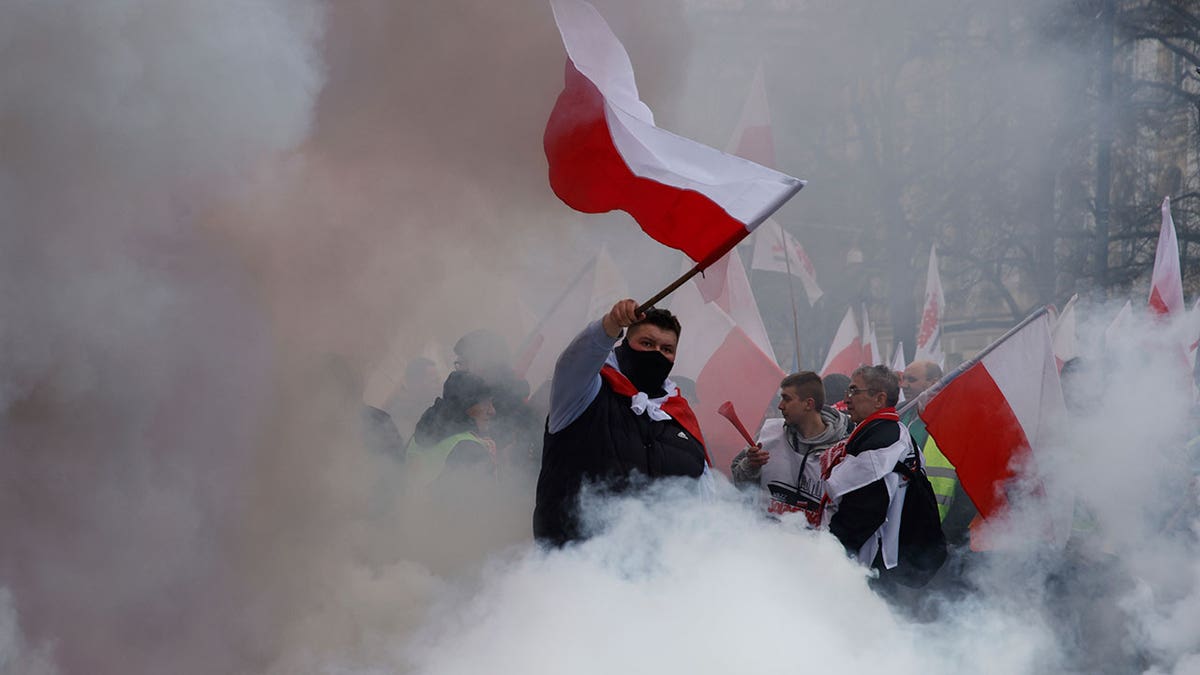Bill Wirtz warns American farmers about government regulation: This should be a ‘key focus’
Luxembourg writer and commentator Bill Wirtz shares advice for U.S. farmers after German farmers protest government regulations.
- Poland experienced its most violent protest by farmers and supporters on Wednesday, the European Union has ruled.
- Police detained over a dozen people and prevented the protesters from accessing the Polish parliament.
- The protests stem from farmers' anger over EU climate policies and food imports from Ukraine, which they believe threaten their livelihoods.
Poland saw its most violent protest by farmers and supporters yet Wednesday as some participants threw stones at police and tried to push through barriers around parliament, injuring several officers, police said.
Police said they detained over a dozen people and prevented the protesters from getting through to the Sejm, the Polish parliament.
Farmers are angry over European Union climate policies and food imports from Ukraine that they say threaten their livelihoods. Such protests have occurred across the 27-member EU in recent weeks, but this one was decidedly angrier than earlier demonstrations in the central European nation.
EU AGRICULTURE MINISTERS MEET TO DISCUSS WIDESPREAD EUROPEAN FARMER PROTESTS
Police noted on the social media platform X that its officers "are not a party to the ongoing dispute" and warned that behavior threatening their safety "cannot be taken lightly and requires a firm and decisive response."

Polish farmers, hunters and their supporters hold a protest on March 6, 2024, in Warsaw, Poland. Poland saw its most violent protest by farmers and supporters yet Wednesday as some participants threw stones at police and tried to push through barriers around parliament, injuring several officers, police said. (AP Photo/Michal Dyjuk)
The deputy agriculture minister, Michał Kołodziejczak, said he didn't believe that "real, normal farmers caused a riot in front of the Sejm today," and that it was necessary to isolate "provocateurs and troublemakers."
He did not say who he thought was behind the violence.
Farmers on tractors blocked highways leading into Warsaw while thousands of their supporters gathered in front of the prime minister's office before marching to the parliament. Some trampled a European Union flag and burned a mock coffin bearing the word "farmer."
Farmers were joined by miners, foresters, hunters and other supporters. They blew horns and set off firecrackers and smoke bombs, despite police warnings that the use of pyrotechnics was banned. Some protesters burned tires.
The protesters are demanding a withdrawal from the EU's Green Deal, a plan meant to fight climate change and protect biodiversity, including with plans requiring farmers to reduce the excessive use of polluting chemicals to boost their crops.
The protests have led politicians to water down some provisions.
FARMER PROTESTS LEAD EU TO GIVE UP PROPOSED PESTICIDE CUT
The protesters also want the Polish-Ukrainian border closed to stop the imports of Ukrainian food products, which farmers say drive down market prices and put Poland’s agricultural sector in jeopardy.
The protest increased pressure on the government of Prime Minister Donald Tusk, a former president of the European Council who is strongly pro-EU and seeks to support Ukraine as it fights Russia's invasion.
Tusk has sought to meet the farmers' demands, calling their frustrations justified. He has said he plans to propose amendments to the Green Deal.
Anti-Ukrainian slogans have featured at the protests in Poland, where authorities have said they are concerned that Russia is trying to leverage legitimate concerns to create divisions between Warsaw and Kyiv.
Agriculture, forestry and fishing make up less than 3% of Poland's GDP, according to the World Bank.
